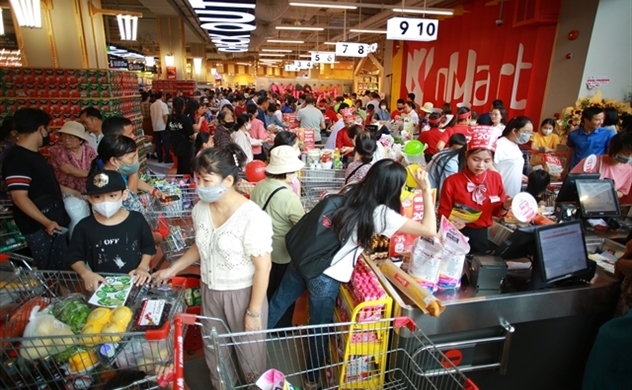Retailers increase their quality to get a competitive edge

Vietnam is a high potential retail market with a size likely to grow to US$350 billion by 2025. Photo by Tran Viet.
Domestic companies gain experience and desire to enhance their company capacity, product quality, service quality, and market share due to increased competition.
Vietnam's retail industry might reach US$350 billion by 2025. Retail accounts for 59% of domestic goods sales. Foreign companies investing in Vietnam will improve their domestic and export distribution networks. AEON, Big C, and MM Mega Market sell and export Vietnamese goods.
Retailers anticipate enormous prospects in traditional and e-commerce in Vietnam, which has 100 million people and 50% youth. Trade analysts say Thailand and other international and local retailers like Saigon Co.op and WinCommerce have expanded in Vietnam.
This year, WinCommerce has over 3,400 outlets of sale countrywide and over two million devoted clients, according to Nguyen Thi Phuong, Permanent Deputy General Director.
WinCommerce wants to add over 1,000 new places of sale and improve revenue by 25%. To enhance its retail chain, the firm will focus on convenience stores and micro supermarkets in urban and rural locations this year instead of building supermarkets or hypermarkets.
Last year's business performance enabled Saigon Co.op become the top retail supermarket with sales of over VND31 trillion, exceeding the target. E-commerce contributed VND1.2 trillion. This store aims to increase 4.5 percent this year by enhancing service and extending its distribution network.
This year, Saigon Co.op general director Nguyen Anh Duc stated the company will boost e-commerce, a market trend. AI technology would help integrate customer experience, understand consumer behavior, and better link users and providers.
Retail market specialist Vu Vinh Phu advised domestic retailers to innovate, establish sustainable brands, and follow manufacturing and business rules. Production and retail associations should help businesses grow.
A Ministry of Industry and Trade representative said overseas retail firms had high potential in financing, people resources, business ability, and management technology.
Strategic programs from their parent firms or the government help them build distribution networks with a closed production-to-consumption chain.
Despite severe competition, Vietnamese retailers are still mostly domestic.
Six of the top 10 supermarket, trade center, and convenience store retailers in Vietnam are domestic, accounting for 42% of the market. WinCommerce (previously VinCommerce) has 15.2%, Saigon Coop 10.5%, and Bach Hoa Xanh 10.5%.
Vietnam has developed a comprehensive set of policies to attract and manage foreign investment capital and promote retail market orientations.
The Prime Minister approved the 2030–2045 domestic trade plan in July 2021.
Between 2020 and 2030, domestic retailers will account for 85 percent of retail sales and overseas retailers for 15 percent.
Vietnam attracts foreign investment in industry and commerce under a January 2023 Ministry of Industry and Trade order.
Local businesses may lose market share without a proper development strategy.
To construct a closed retail supply chain from manufacturing, processing, shipping, and distribution, local businesses must link.
This ensures a tight and flexible supply chain, full and improved goods, sales and post-sales services, and most crucially, competitive rates.
Businesses must invest in chain shops and supermarkets and collaborate to build new retail models to move away from the old shopping model.
Experts advised building Vietnamese retail channels by Vietnamese people in addition to attracting foreign investment to create favorable conditions for retail enterprises. Developing cleaner and greener production, a circular economy, and green labeling requires a policy.
Vietnamese retailers must brand themselves via greetings, post-sales rules, and customer service.
Vietnamese retailers should compete and cooperate with global firms to learn innovative retail technologies. Promote local manufacturing and distribution channels and build strong ties with Vietnamese firms.
Source: VNS
Same category news
-
Hoàng Kim
Latest news
-
Vân Nguyễn
-
Huyen Hoang

 TIẾNG VIỆT
TIẾNG VIỆT 
_291615658.jpg)
















